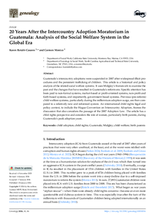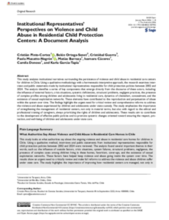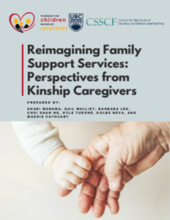This page contains documents and other resources related to children's care in the Americas. Browse resources by region, country, or category.
Displaying 1 - 10 of 3194
The CAFO Summit 2026 is a major annual gathering hosted by the Christian Alliance for Orphans (CAFO), scheduled for September 23–25, 2026 at First Baptist Atlanta in Georgia.
This study examined the relationship between disability type and service receipt among U.S. transition-age youth aging out of foster care, a population in which 53% have a diagnosed disability, across all U.S. states, Washington, DC, and Puerto Rico.
This article describes how the U.S.
This article analyzes Guatemala’s child welfare and intercountry adoption systems before and after the 2007 suspension, using Midgley’s framework to examine reforms across non-formal, market-based, non-profit, faith-based, and government systems. Framed by international child rights law, including the Hague Convention, it highlights the shift from illicit, profit-driven adoption practices toward a reformed system while centering child rights and the experiences of birth mothers during the peak adoption era.
The opinion argues that the recent U.S.
The rapid scale-up of immigration enforcement operations in the United States throughout 2025 has resulted in the termination of legal status, detention, and deportation for hundreds of thousands of immigrants.
This qualitative study analyzes institutional narratives between 2002 and 2024 to understand how violence and child abuse have persisted in residential care centers in Chile, drawing on interviews and public statements from child protection authorities. The findings identify systemic deficiencies, structural problems, negligent practices, concealment, and sexual exploitation networks as key factors perpetuating abuse, underscoring the urgent need for comprehensive reforms, stronger oversight, and enhanced ethical and professional standards to safeguard the rights and well-being of children under state care.
This report presents findings from a 2022 consultation with kinship caregivers across British Columbia, highlighting their experiences navigating children and family services. Analysis revealed the need for recognition and respect for kinship families, improved access to consistent and equitable supports, trauma-informed and culturally grounded practices, and stronger collaboration with service providers, with caregivers’ calls for action emphasizing system improvements to sustain caregiving and promote children’s well-being.
Belize has made important strides in strengthening its child protection system; however, significant challenges remain.




